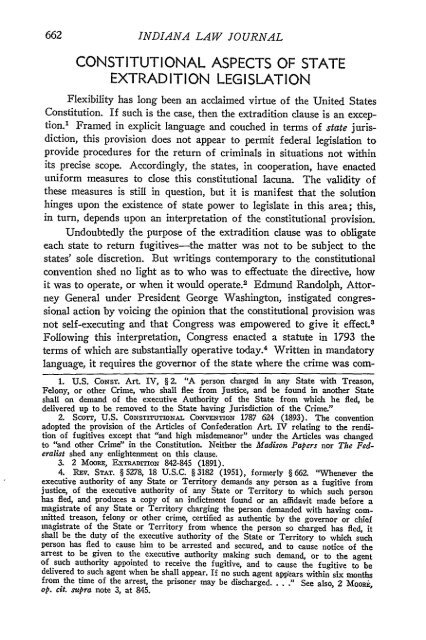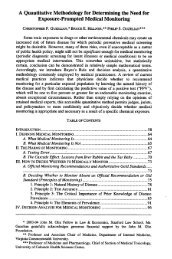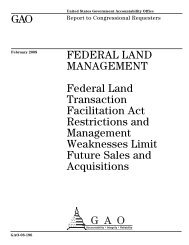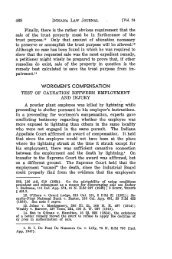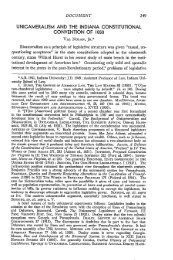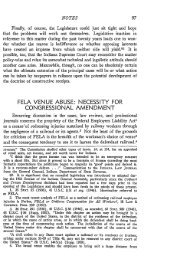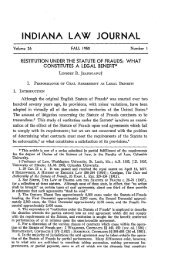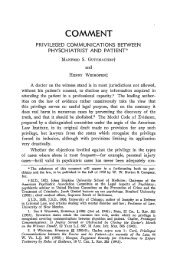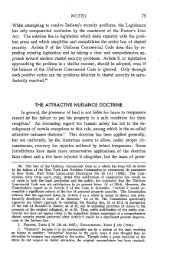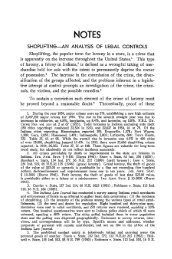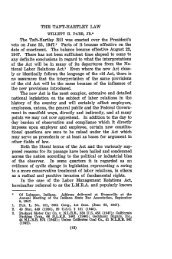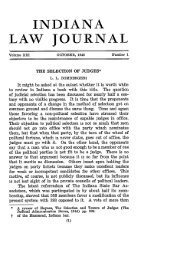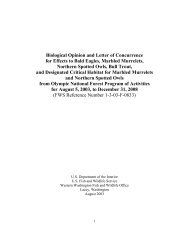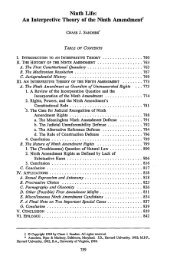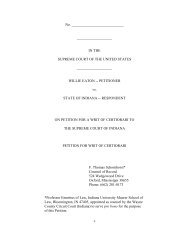constitutional aspects of state extradition legislation - Indiana Law ...
constitutional aspects of state extradition legislation - Indiana Law ...
constitutional aspects of state extradition legislation - Indiana Law ...
Create successful ePaper yourself
Turn your PDF publications into a flip-book with our unique Google optimized e-Paper software.
INDIANA LAW JOURNAL<br />
CONSTITUTIONAL ASPECTS OF STATE<br />
EXTRADITION LEGISLATION<br />
Flexibility has long been an acclaimed virtue <strong>of</strong> the United States<br />
Constitution. If such is the case, then the <strong>extradition</strong> clause is an exception."<br />
Framed in explicit language and couched in terms <strong>of</strong> <strong>state</strong> jurisdiction,<br />
this provision does not appear to permit federal <strong>legislation</strong> to<br />
provide procedures for the return <strong>of</strong> criminals in situations not within<br />
its precise scope. Accordingly, the <strong>state</strong>s, in cooperation, have enacted<br />
uniform measures to close this <strong>constitutional</strong> lacuna. The validity <strong>of</strong><br />
these measures is still in question, but it is manifest that the solution<br />
hinges upon the existence <strong>of</strong> <strong>state</strong> power to legislate in this area; this,<br />
in turn, depends upon an interpretation <strong>of</strong> the <strong>constitutional</strong> provision.<br />
Undoubtedly the purpose <strong>of</strong> the <strong>extradition</strong> clause was to obligate<br />
each <strong>state</strong> to return fugitives-the matter was not to be subject to the<br />
<strong>state</strong>s' sole discretion. But writings contemporary to the <strong>constitutional</strong><br />
convention shed no light as to who was to effectuate the directive, how<br />
it was to operate, or when it would operate. 2 Edmund Randolph, Attorney<br />
General under President George Washington, instigated congressional<br />
action by voicing the opinion that the <strong>constitutional</strong> provision was<br />
not self-executing and that Congress was empowered to give it effect. 3<br />
Following this interpretation, Congress enacted a statute in 1793 the<br />
terms <strong>of</strong> which are substantially operative today. 4 Written in mandatory<br />
language, it requires the governor <strong>of</strong> the <strong>state</strong> where the crime was cor-<br />
1. U.S. CoNsT. Art. IV, § 2. "A person charged in any State with Treason,<br />
Felony, or other Crime, who shall flee from Justice, and be found in another State<br />
shall on demand <strong>of</strong> the executive Authority <strong>of</strong> the State from which he fled, be<br />
delivered up to be removed to the State having Jurisdiction <strong>of</strong> the Crime."<br />
2. ScoTT, U.S. CONSTITUTIONAL CONVENTION 1787 624 (1893). The convention<br />
adopted the provision <strong>of</strong> the Articles <strong>of</strong> Confederation Art. IV relating to the rendition<br />
<strong>of</strong> fugitives except that "and high misdemeanor" under the Articles was changed<br />
to "and other Crime" in the Constitution. Neither the Madison Papers nor The Federalist<br />
shed any enlightenment on this clause.<br />
3. 2 MOORE, ExnRADITIoN 842-845 (1891).<br />
4. REv. STAT. § 5278, 18 U.S.C. § 3182 (1951), formerly § 662. "Whenever the<br />
executive authority <strong>of</strong> any State or Territory demands any person as a fugitive from<br />
justice, <strong>of</strong> the executive authority <strong>of</strong> any State or Territory to which such person<br />
has fled, and produces a copy <strong>of</strong> an indictment found or an affidavit made before a<br />
magistrate <strong>of</strong> any State or Territory charging the person demanded with having committed<br />
treason, felony or other crime, certified as authentic by the governor or chief<br />
magistrate <strong>of</strong> the State or Territory from whence the person so charged has fled, it<br />
shall be the duty <strong>of</strong> the executive authority <strong>of</strong> the State or Territory to which such<br />
person has fled to cause him to be arrested and secured, and to cause notice <strong>of</strong> the<br />
arrest to be given to the executive authority making such demand, or to the agent<br />
<strong>of</strong> such authority appointed to receive the fugitive, and to cause the fugitive to be<br />
delivered to such agent when he shall appear. If no such agent appears within six months<br />
from the time <strong>of</strong> the arrest, the prisoner may be discharged ... " See also, 2 Moomi,<br />
op. cit. supra note 3, at 845.
NOTES<br />
mitted to demand the fugitive's return by the executive authority <strong>of</strong> the<br />
asylum <strong>state</strong>. In addition, the alleged fugitive must have been charged<br />
with a crime in the demanding <strong>state</strong> and must have fled from justice. 5<br />
If the governor <strong>of</strong> the asylum <strong>state</strong> signs the rendition papers, the<br />
alleged criminal may challenge the propriety <strong>of</strong> such action in the asylum<br />
<strong>state</strong>'s courts upon two grounds: first, he must prove that he was not<br />
substantially charged with a crime under the demanding <strong>state</strong>'s laws;<br />
second, he must show that he was not a fugitive from justice from the<br />
demanding <strong>state</strong>. It is <strong>of</strong> importance that this latter requirement has<br />
been construed to mean that the person must have been physically present<br />
in the demanding <strong>state</strong> when the crime was committed and must have<br />
subsequently fled.'<br />
The cases have, therefore, clearly interpreted the federal act and<br />
the procedures to be followed in respect to it. Since the congressional<br />
measure fails to provide a method for a fugitive's arrest and return, much<br />
<strong>state</strong> <strong>legislation</strong> has been directed to this end ;7 and it has been held <strong>constitutional</strong>."<br />
Other enactments intended to supplement the federal provision,<br />
however, present debatable <strong>constitutional</strong> questions thus far unanswered.<br />
Included in this category are the Uniform Extradition Act, Section 6,<br />
the Uniform Reciprocal Enforcement <strong>of</strong> Support Act, Section 5, and<br />
the Uniform Out-<strong>of</strong>-State Parolee Compact, Section 1. 9 All <strong>of</strong> these<br />
acts go beyond the <strong>constitutional</strong> provision in the sense that they provide<br />
for rendition in situations not contemplated therein.<br />
5. In Kentucky v. Dennison, 24 How. 66 (U.S. 1860), the Supreme Court upheld<br />
the power <strong>of</strong> Congress to legislate regarding <strong>extradition</strong>. The Court further held that<br />
the Constitution as well as the act <strong>of</strong> Congress contemplated a demand on the executive<br />
authority <strong>of</strong> the asylum <strong>state</strong> for the return <strong>of</strong> fugitives but that the governor<br />
was under only a moral obligation to comply with such proper demand, and the courts<br />
could not mandate the governor to extradite.<br />
6. Biddinger v. Commissioner <strong>of</strong> Police <strong>of</strong> N.Y., 245 U.S. 128 (1917); Roberts<br />
v. Reilly, 116 U.S. 80 (1885).<br />
7. UNIFORM EXTRADITION ACT §§ 12-28 (1936), establish the procedures <strong>of</strong> arrest<br />
and return which shall govern in <strong>extradition</strong> <strong>of</strong> criminals. COUNCIL OF STATE Gov-<br />
ERNMENTs, THE HANDBOOK ON INTEmSTATE CRIMEra CONTROL 8-30 (1949).<br />
8. Innes v. Tobin, 240 U.S. 127 (1915). The petitioner had been extradited from<br />
Oregon to Texas to stand trial for a crime. Upon acquittal, Georgia demanded the<br />
return <strong>of</strong> the petitioner for trial on another crime. Petitioner argued that since she<br />
was involuntarily taken into Texas and had not fled to that <strong>state</strong> she was not subject<br />
to rendition to Georgia. Since petitioner did not allege that she- had never been in<br />
Georgia the Supreme Court assumed this fact to be true, and found that allowing<br />
the return to the demanding <strong>state</strong> <strong>of</strong> a fugitive who is involuntarily brought into the<br />
asylum <strong>state</strong> was valid. The failure <strong>of</strong> the federal government to provide for this<br />
situation left it in the hands <strong>of</strong> <strong>state</strong> authority.<br />
9. See discussions by COUNCIL OF STATE GOVERNMENTS, op.clt, szopra note 7.<br />
For background facts concerning the Uniform Extradition Act and the Parolee<br />
Compact see Note, 31 MINN. L. REv. 699 (1947).
664<br />
INDIANA LAW JOURNAL<br />
For example, when a crime is committed in the demanding <strong>state</strong><br />
by a person not present in the <strong>state</strong>, neither the <strong>constitutional</strong> provision<br />
nor federal <strong>legislation</strong> enacted pursuant to it furnish a means <strong>of</strong> <strong>extradition</strong>.<br />
The phrase "to flee from justice and be found in another <strong>state</strong>" 10<br />
has been interpreted by the Supreme Court to mean that the alleged<br />
criminal must have been in the demanding <strong>state</strong> at the time the crime was<br />
committed and subsequently fled." Thus, a person standing in <strong>state</strong> X and<br />
shooting B in <strong>state</strong> Y could not be extradited under congressional<br />
authority; the accessory in <strong>state</strong> A to a crime committed in <strong>state</strong> B is<br />
similarly shielded from justice; the runaway father who fails to support<br />
his family would also be immune from criminal prosecution in the<br />
demanding <strong>state</strong>. Therefore, geographical location, obviously irrelevant<br />
in determining whether a crime has been committed, would prevent<br />
<strong>extradition</strong> under applicable federal <strong>legislation</strong>. It was to bridge this<br />
gap in the Constitution and the congressional act that the Uniform Criminal<br />
Extradition Act, Section 6, and the Uniform Reciprocal Enforcement<br />
<strong>of</strong> Support Act, Section 5 were passed. 12 Manifestly, the Constitution<br />
was not intended to serve as a shield to criminals; consequently an<br />
interpretation <strong>of</strong> the <strong>extradition</strong> clause which supports the validity <strong>of</strong><br />
these uniform acts would rest upon firm foundation.' 3<br />
The Parolee Compact, 14 approved by all <strong>of</strong> the <strong>state</strong>s, was adopted<br />
10. U.S. CoNsT. Art. IV, § 2.<br />
11. Hogan v. O'Neill, 225 U.S. 52 (1920); Hyatt v. New York ex rel. Cockran,<br />
188 U.S. 691 (1902) ; Roberts v. Reilly, 116 U.S. 80 (1885).<br />
12. Thirty-five <strong>state</strong>s have adopted the Uniform Extradition Act. E.g., CAl_<br />
PEN. CODE §§ 1548-1556.2 (1949) ; FLA. STAT. §§ 941.01-941.29 (1951) ; IND. ANN. STAT.<br />
§§ 9-403--9-417 (Burns 1942) ; IowA CODE ANN. c. 759, § 1 et seq. (1951) ; N. Y. CODE<br />
CRim. PRoc. §829; TFx. CODE CRIm. PRoc. ANN. art. 1008a, (Supp. 1952). See THE<br />
CouxciL OF STATE GOVERNMENTS, THE BOOK OF THE STATES 137 (1952-53), for an<br />
up-to-date list <strong>of</strong> the <strong>state</strong>s which have adopted this <strong>legislation</strong>.<br />
Thirty-nine <strong>state</strong>s have adopted the Uniform Reciprocal Enforcement <strong>of</strong> Support<br />
Act. E.g., IND. ANN. STAT. §§ 3-3102 et seq. (Burns Supp. 1951); Ky. REv. STAT.<br />
§§407-010 et seq. (Legis. Supp. 1950); OHIo GEN. CODE ANN. §§ 8007-1 et 4eq. (1951).<br />
See THE COUNCIL OF STATE GOVERNMENTS, RECIPROCAL STATE LEaGISTION TO ENFORCE<br />
THE SUPPORT OF DEPENDENTS (1951), for other <strong>state</strong>s which have adopted this <strong>legislation</strong>.<br />
13. Doubt is expressed as to the <strong>constitutional</strong>ity <strong>of</strong> the UNIFoRM ExT rnox<br />
ACT § 6 in Green, Duties <strong>of</strong> the Asylum State Under the Uniform Criminal Extradition<br />
Act, 30 J. Ciam. L. & CRIMINOLOGY 295, 323 (1939-40).<br />
14. States are prohibited from entering into compacts without the consent <strong>of</strong><br />
Congress by U.S. CONST. Art. 1, § 10. Compacts are actually contracts between the<br />
<strong>state</strong>s by which boundary disputes may be settled, or through which the cost <strong>of</strong> a<br />
bridge between the <strong>state</strong>s may be-shared. Usually <strong>state</strong>s enter into their compacts<br />
and then look to Congress for its approval; however, in 1934 Congress passed a<br />
statute giving its advance consent to two or more <strong>state</strong>s to enter into compacts to<br />
aid in the mutual enforcement <strong>of</strong> their criminal laws. 4 U.S.C. § 111 (Supp. 1952),<br />
formerly 18 U.S.C. § 420. Under this authority from the federal government all <strong>state</strong>s<br />
have entered the Parolee Compact. The method used by the <strong>state</strong>s in adopting this<br />
compact was through passage <strong>of</strong> an enabling act by the various legislatures allowing
NOTES<br />
to solve a somewhat different problem than that dealt with by the Uniform<br />
Extradition Act.' 5 Often parole <strong>of</strong>ficials found it desirable to permit<br />
a parolee to serve the terms <strong>of</strong> his parole in a foreign <strong>state</strong>. Since no<br />
methods were available to supervise the parolee, it was necessary to<br />
utilize <strong>extradition</strong> procedure to achieve return <strong>of</strong> 'a man who had been<br />
only conditionally released from incarceration for the commission <strong>of</strong> a<br />
crime. Following this procedure enabled the parolee to challenge his<br />
return in a habeas corpus action on the technical grounds that, since he<br />
was permitted to leave the demanding <strong>state</strong>, he was not a fugitive from<br />
justice within the meaning <strong>of</strong> the federal statute.: 6 If the <strong>state</strong> relied<br />
upon the Uniform Extradition Act, the parolee based his opposition to<br />
return upon the <strong>constitutional</strong> invalidity <strong>of</strong> that Act. 17 Although these<br />
arguments have been ineffective in <strong>state</strong> courts,' the litigious nature <strong>of</strong><br />
the <strong>extradition</strong> procedure rendered this machinery unwieldly and undesirable.<br />
As a practical matter these defenses may be anticipated by<br />
restricting the parolee to the demanding <strong>state</strong> as a term <strong>of</strong> parole. If a<br />
parolee breaches this term, he then has no standing to question <strong>extradition</strong>.'<br />
9 The undesirability <strong>of</strong> this method <strong>of</strong> return is evident, however,<br />
upon even a slight consideration <strong>of</strong> the influences which make out-<strong>of</strong><strong>state</strong><br />
parole desirable for society.<br />
To alleviate this situation, the Parolee Compact provides for supervision<br />
<strong>of</strong> an out-<strong>of</strong>-<strong>state</strong> parolee by <strong>of</strong>ficials <strong>of</strong> the foreign <strong>state</strong> and also<br />
stipulates that upon breach <strong>of</strong> parole the <strong>of</strong>ficers <strong>of</strong> the paroling <strong>state</strong><br />
may return the violator without resort to <strong>extradition</strong> proceedings. 20<br />
Thus, the Extradition Act, Section 6, permits rendition in circumstances<br />
not sufficient to invoke <strong>extradition</strong> under the federal enactment, while<br />
the Parolee Compact avoids its restrictive provisions by the simple<br />
expedient <strong>of</strong> ignoring established <strong>extradition</strong> procedures. Nevertheless,<br />
similar influential policy considerations support an interpretation <strong>of</strong> the<br />
the governors <strong>of</strong> the <strong>state</strong>s to compact with all the United States on the terms set<br />
down in the enactment. See the discussion by THE COUNCIL OF STATE GOVERNMENTS,<br />
op. cit. supra note 7, at 46-84.<br />
15. E.g., COLO. STAT. ANN. c. 153, §§44(7)-44(25) (1935); IND. ANN. STAT.<br />
§ 9-3001 (Burns Supp. 1951); MICH. Comp. LAws § 7801. et seq (1948); MINN. STAT.<br />
§ 637.16 (1947). For an up-to-date list <strong>of</strong> <strong>state</strong>s which have adopted this compact, see<br />
THE COUNCIL OF STATE GOVERNMENTS, op. cit. supra note 12, at 23.<br />
16. Ex parte Kabrich, 343 Mo. 196, 120 S.W2d 42 (1942).<br />
17. Culbertson v. Sweeney, 70 Ohio App. 334, 44 N.E.2d 807 (1942).<br />
18. In Ex parte Garvey, 133 Tex. Cr. 500, 112 S.W.2d 747 (1938), the court held<br />
that an out-<strong>of</strong>-<strong>state</strong> parolee was subject to <strong>extradition</strong> as a fugitive from justice.<br />
19. Reed v. Colpoys, 69 App. D.C. 163, 99 F.2d 396 (D.C. Cir. 1938); Ross v.<br />
Becher, 382 IIl. 404, 47 N.E.2d 475 (1943) ; Ex parte Summers, 40 Wash. 2d 419, 243 P.2d<br />
494 (1953).<br />
20. UNIFORM PAROLEE COMPACT, IND. ANN. STAT. § 9-3001 (Burns Supp. 1951).
INDIANA LAW JOURNAL<br />
United States Constitution which would validate the Compact. Particularly<br />
persuasive is the flexibility thus imparted to the parole system,<br />
thereby permitting the parolee to be readjusted to society in an environment<br />
most conducive to that end. 21 Geographic location arbitrarily fixed<br />
by <strong>state</strong> boundary lines should not be permitted to encase the parole<br />
system in a straitjacket. To the extent that regular <strong>extradition</strong> proceedings<br />
would have this effect, the Parolee Compact attains added desirability.<br />
Despite the obvious advantages <strong>of</strong> these <strong>state</strong> enactments, a holding<br />
that Congress has the exclusive power to legislate regarding <strong>extradition</strong><br />
is possible. In fact early writers upon the subject assumed that this<br />
was true. 2 2 Although the Supreme Court, in Innes v. Tobin, upheld<br />
<strong>extradition</strong> <strong>of</strong> a person who was involuntarily moved to the asylum<br />
<strong>state</strong>, stating that federal <strong>legislation</strong> was not exclusive, other language<br />
in the case indicates that the Court felt the <strong>state</strong>s may legislate only<br />
within the limits <strong>of</strong> the <strong>constitutional</strong> provision. 23 Circumscribing <strong>state</strong><br />
legislative power to those fact situations in which the person committed<br />
the crime while in the demanding <strong>state</strong> would render Section 6<br />
<strong>of</strong> the Uniform Extradition Act un<strong>constitutional</strong>. Similarly, the <strong>constitutional</strong>ity<br />
<strong>of</strong> the Parolee Compact would be open to serious question.<br />
The Constitution, as int&preted, requires a demand upon the governor<br />
<strong>of</strong> the asylum <strong>state</strong> by the executive authority <strong>of</strong> the demanding<br />
<strong>state</strong>. 2 4 The complete absence <strong>of</strong> <strong>extradition</strong> procedures in the machinery<br />
<strong>of</strong> the Parolee Compact obviously does not accord with the <strong>constitutional</strong><br />
provision.<br />
Since the language <strong>of</strong> Innes v. Tobin is dicta, however, its import<br />
should not be exaggerated. 25 Moreover, the context <strong>of</strong> the Court's<br />
decision did not include <strong>state</strong> <strong>legislation</strong> which had been uniformly<br />
adopted to meet everyday actualities in the administration <strong>of</strong> criminal<br />
justice. The presence <strong>of</strong> such <strong>legislation</strong>, supported as it is by sound<br />
21. Other factors which would seem to support the <strong>constitutional</strong>ity <strong>of</strong> the Parolee<br />
Compact are: first, convicted criminals subject to confinement are being dealt with;<br />
second, as terms <strong>of</strong> their parole to another <strong>state</strong> the parolee consents to return without<br />
<strong>extradition</strong>; and third, if normal <strong>extradition</strong> proceedings were followed and the parolee<br />
sought review on habeas corpus there are no important questions which he might raise,<br />
for whether or not there is a parol violation is determined by the laws <strong>of</strong> the paroling<br />
<strong>state</strong>. People v. Ruthazer, 98 N.Y.S.2d 104, 107 N.E.2d 458 (1952).<br />
22. 2 MooRE, op.cit. supra note 3, at 863-64. The language in early cases also<br />
indicates this view. Kentucky v. Dennison, 24 How. 66 (U.S. 1860); Prigg v. Commonwealth,<br />
16 Pet. 539 (U.S. 1842).<br />
23. Innes v. Tobin, 240 U.S. 127 (1915). See note 8 supra.<br />
24. Kentucky v. Dennison, 24 How. 66 (U.S. 1860).<br />
25. 240 U.S. 127 (1915). The Supreme Court in this case did not precisely decide<br />
the question <strong>of</strong> whether <strong>state</strong> <strong>legislation</strong> may go beyond the limits <strong>of</strong> the Constitution.
NOTES<br />
social policy, increases the probability that the <strong>constitutional</strong> provision<br />
will not be construed so as to frustrate cooperative efforts by the <strong>state</strong>s<br />
to meet a problem which possibly could not be <strong>constitutional</strong>ly solved<br />
by federal action.<br />
At least two possible interpretations <strong>of</strong> the <strong>constitutional</strong> provision<br />
could be utilized to sustain the <strong>state</strong> <strong>legislation</strong> and compacts-one<br />
is analogous to the approach to the affirmative powers <strong>of</strong> Congress as<br />
exemplified by the commerce clause, the other merely advances the thesis<br />
that the <strong>state</strong>s are free to provide rendition in situations other than the<br />
one provided for and contemplated by the Constitution. Although the<br />
practical effect <strong>of</strong> the two propositions is substantially the same, the<br />
gauge by which <strong>state</strong> techniques would be measured upon judicial review<br />
materially differs.<br />
Following the commerce clause type <strong>of</strong> approach the rendition clause<br />
<strong>of</strong> the Constitution would be treated as an affirmative power <strong>of</strong> Congress,<br />
the latter body having exclusive power to act within the limits<br />
delineated by the Constitution. Then, <strong>state</strong> <strong>legislation</strong> would be permissible<br />
ins<strong>of</strong>ar as federal action was not intended to be exclusive and if<br />
<strong>state</strong> enactments did not interfere with federal policy. Beyond the bounds<br />
<strong>of</strong> the power conferred upon Congress, <strong>state</strong> <strong>legislation</strong> would be<br />
proper. 26 Consequently, it could be argued that since the Constitution<br />
does not provide for the rendition <strong>of</strong> persons not in the <strong>state</strong> when the<br />
crime was committed, for Congress to legislate regarding this matter<br />
would violate its <strong>constitutional</strong> grant <strong>of</strong> power. Hence, a <strong>state</strong>'s <strong>legislation</strong><br />
with respect to this situation would be a valid exercise <strong>of</strong> its<br />
reserved power. Likewise, the proposition would seem valid that a<br />
parolee who is allowed to serve his parole in a foreign <strong>state</strong> is not a<br />
fugitive from justice within the meaning <strong>of</strong> the Constitution and thus-,<br />
the power to regulate the means <strong>of</strong> return does not fall within the power<br />
cf Congress but may properly be exercised by the <strong>state</strong>s.<br />
Though this view would sustain the <strong>constitutional</strong>ity <strong>of</strong> the <strong>state</strong><br />
enactments, sound objections may be <strong>of</strong>fered against it. As a technical<br />
matter it should be noted that the <strong>extradition</strong> clause is not included as<br />
part <strong>of</strong> the affirmative powers granted to Congress. 27 Of more importance,<br />
however, is the realization that the extent <strong>of</strong> review implied by<br />
imputing some kind <strong>of</strong> negative implication to the <strong>extradition</strong> clause<br />
26. This commerce clause approach is demonstrated in Southern Pacific Co. v.<br />
Arizona, 325 U.S. 761 (1945); South Carolina State Highway Dep't v. Barnwell Bros.,<br />
303 U.S. 177 (1938); Cooley v. Board <strong>of</strong> Wardens, 12 How. 299 (U.S. 1851).<br />
27. The affirmative powers <strong>of</strong> Congress are set forth in U.S. CoNsT. Art. 1,<br />
§ 8, while the <strong>extradition</strong> clause is in Art. 4, § 2.
INDIANA LAW JOURNAL<br />
is highly inconsistent with the relative <strong>state</strong> and national interests concerned.<br />
Since the infractions concerned are committed against <strong>state</strong><br />
kaw and since the <strong>state</strong> is the authority seeking return, the sole national<br />
interest would seem to extend no further than provision for a uniform<br />
method <strong>of</strong> rendition in order to effectuate the executory <strong>extradition</strong><br />
clause. The absence <strong>of</strong> strong national concern is further emphasized<br />
by the fact that, despite an apparent need for revision, the federal <strong>extradition</strong><br />
statute has been unchanged in substance since its original passage<br />
in 1793.28 In addition, the commerce clause analogy has little basis<br />
in fact since the clause deals with a subject matter <strong>of</strong> such national concern<br />
that even in the absence <strong>of</strong> federal <strong>legislation</strong>, <strong>state</strong> enactments<br />
which affect inter<strong>state</strong> commerce may sometimes be invalidated. 29 Thus,<br />
in establishing the meaning <strong>of</strong> the commerce clause, the Supreme Court<br />
has played a major role in determining the extent <strong>of</strong> federal power and<br />
<strong>of</strong> permissible encroachment by <strong>state</strong> law. Such review by the Supreme<br />
Court seems unwarranted with reference to inter<strong>state</strong> rendition where<br />
the <strong>state</strong> concern is so strong and the national interest so minimal.<br />
For this reason, therefore, merit exists in an alternative interpretation<br />
<strong>of</strong> the <strong>extradition</strong> clause. Adopted by several <strong>state</strong> appellate<br />
courts in upholding the propriety <strong>of</strong> the uniform <strong>state</strong> <strong>legislation</strong>, the<br />
Constitution, in this view, empowers Congress to provide a procedure<br />
for the return <strong>of</strong> fugitives. But the <strong>state</strong>s, although always able to<br />
utilize the means which Congress furnishes, are free in the exercise <strong>of</strong><br />
their own power to employ new methods <strong>of</strong> rendition for law violators<br />
and new classes <strong>of</strong> persons who may be returned to a demanding <strong>state</strong>. 30<br />
Under this approach the Supreme Court would merely interpret federal<br />
28. The original federal law was passed in 1793. For discussion see 2 MOORE,<br />
op.cit. supra note 3, at 845-8.<br />
29. Southern Pacific Co. v. Arizona, 325 U.S. 761 (1945).<br />
30. In Ex parte Tenner, 20 Cal.2d 670, 128 P.2d 338 (1942), the California Supreme<br />
Court dealt with the <strong>constitutional</strong>ity <strong>of</strong> the return <strong>of</strong> an out-<strong>of</strong>-<strong>state</strong> parolee<br />
without following <strong>extradition</strong> proceedings. The court concluded that the Constitution<br />
and federal statute provided an alternative method <strong>of</strong> return, but the <strong>state</strong>s had power<br />
to allow a return <strong>of</strong> a parolee without following these proceedings. The court also<br />
injected into the opinion the fact that the parolee as terms <strong>of</strong> his parol had consented<br />
to such a return. See also, Gulley v. Apple, 213 Ark. 350, 210 S.W.2d 514 (1948);<br />
People v. Ruthazer, 98 N.Y.S.2d 104, 107 N.E.2d 458 (1952) ; Pierce v. Smith, 31<br />
Wash.2d 52, 195 P.2d 112 (1948). In Culbertson v. Sweeney, 70 Ohio App. 334, 44<br />
N.E.2d 807 (1942), the court held that the Uniform Extradition Act § 6, allowing<br />
rendition <strong>of</strong> a person not in the demanding <strong>state</strong> when the crime was committed, was<br />
<strong>constitutional</strong>. This was said to be a valid exercise <strong>of</strong> the <strong>state</strong>'s police power. See also,<br />
Ex parte Morgan, 86 Cal. App.2d 217, 194 P.2d 800 (1948); McLarnan v. Hasson,<br />
242 Iowa 1192, 48 N.W.2d 887 (1951); Ex parte Dalton, 56 N.M. 407, 244 P.2d 790<br />
(1952).<br />
For discussion <strong>of</strong> Ex parte Tenner see Note, 43 COL. L. REv. 379 (1943); see<br />
91 U. <strong>of</strong> PA. L. Ray. 669 (1943) for comment on Culbertson v. Sweetwy.
NOTES<br />
<strong>legislation</strong>, thus avoiding the necessity to define the limits <strong>of</strong> national<br />
power, the extent to which it has been exercised, and the determination<br />
as to whether <strong>state</strong> <strong>legislation</strong> conflicts. In other words, no limitation<br />
upon <strong>state</strong> power would be implied from the <strong>extradition</strong> clause <strong>of</strong> the<br />
Constitution.<br />
Superficially, such an interpretation seems radical for it apparently<br />
gives the <strong>state</strong>s unrestricted authority to legislate in this field, including<br />
the power to replace a well-established system <strong>of</strong> <strong>extradition</strong>. But no<br />
grounds may be posited which support an implication that the <strong>state</strong>s<br />
would abuse this power; existing uniform <strong>state</strong> laws have been <strong>of</strong> material<br />
benefit. Moreover, merely because the <strong>extradition</strong> clause places no<br />
limitation on the <strong>state</strong>s, it does not follow that the <strong>state</strong>s have unfettered<br />
power. The due process clause <strong>of</strong> the Constitution could feasibly be used<br />
to check the use <strong>of</strong> questionable rendition <strong>legislation</strong>. Though no<br />
Supreme Court decisions establish this function <strong>of</strong> due process, its<br />
possible application has been recognized, at least, by <strong>state</strong> courts. 31<br />
Should <strong>state</strong> <strong>legislation</strong> result in grave injustice, the due process concept<br />
could be utilized to prevent its operation, for it is well established that<br />
<strong>state</strong> action not consonant with basic standards <strong>of</strong> justice is a denial<br />
<strong>of</strong> due process <strong>of</strong> law. 32 That some <strong>state</strong>s might so act is not mere conjecture.<br />
A. compact entered into by Kansas, New Mexico, Colorado, and<br />
Wyoming 3 stipulates that the <strong>of</strong>ficers <strong>of</strong> any <strong>of</strong> these <strong>state</strong>s in pursuit<br />
<strong>of</strong> an alleged criminal may cross the borders <strong>of</strong> any other member <strong>state</strong><br />
to arrest and return him without resorting to <strong>extradition</strong> proceedings."<br />
If the effect <strong>of</strong> this agreement is to legalize the removal <strong>of</strong> a supposed<br />
31. People v. Ruthazer, 98 N.Y.S.2d 104, 107 N.E.2d 458 (1952); Pierce v. Smith,<br />
31 Wash.2d 52, 195 P.2d 112 (1948).<br />
32. Gibbs v. Burke, 337 U.S. 773 (1949); Ashcraft v. Tennessee, 322 U.S. 143<br />
(1943).<br />
33. COLO. STAT. ANN. c. 153, §§44(1)-(5) (1935). Officers <strong>of</strong> member <strong>state</strong>s<br />
are allowed to arrest:<br />
"(a) While in pursuit <strong>of</strong> any person who has committed a felony in said <strong>state</strong>; or<br />
(b) While in pursuit <strong>of</strong> any person who had been charged with the commission<br />
<strong>of</strong> a felony in said <strong>state</strong>; or<br />
(c) While in pursuit <strong>of</strong> any person who escaped from custody <strong>of</strong> any penitentiary,<br />
jail. .. ."<br />
Under these situations <strong>extradition</strong> is waived and <strong>of</strong>ficers <strong>of</strong> the compacting <strong>state</strong>s<br />
are authorized to make an arrest and removal <strong>of</strong> a person. See discussion by THE<br />
COUNCIL OF STATE GOVERNMENTS, op. cit. supra note 7, at 4-6.<br />
34. The UNIFORM FRESH PURSUIT AcT § 2, allows arrest by <strong>of</strong>ficers, but requires<br />
that a magistrate determine the lawfulness <strong>of</strong> the arrest, and that the alleged criminal<br />
be held for <strong>extradition</strong>. See discussion by THE COUNCIL OF STATE GOVERNMENTS,<br />
op. cit. supra note 7, at 1-7. Examples <strong>of</strong> the Uniform Fresh Pursuit Act may be found<br />
in CAL. PEN. CODE §§ 852-852.4 (1949); IND. ANN. STAT. §§9-451-9-458 (Bums<br />
Supp. 1951); IOWA CODE ANN. c. 756, § 1 (1951); MIcH. Comp. LAws §§ 780.101-<br />
780.108 (1948).
INDIANA LAW JOURNAL<br />
criminal without affording him an opportunity to secure a writ <strong>of</strong> habeas"<br />
corpus to determine if the compact has been complied with, successful<br />
objection might be made that due process has not been accorded: 35 The<br />
Supreme Court has held that one has no right to <strong>extradition</strong> proceedings,<br />
hence if a person is illegally removed from a jurisdiction his sole<br />
remedy is a civil action against the removing <strong>of</strong>ficers. No question concerning<br />
the illegal return may be raised at the criminal trial in the demanding<br />
<strong>state</strong>'s courts. 3 6 It does not by necessity follow, that a <strong>state</strong><br />
has power to authorize the return <strong>of</strong> a person by local <strong>of</strong>ficers or by<br />
<strong>of</strong>ficers <strong>of</strong> the demanding <strong>state</strong> without giving him an opportunity to<br />
challenge the removal in court.<br />
<strong>Law</strong> enforcement <strong>of</strong>ficers possess no authority to arrest except<br />
upon a reasonable belief that a crime has been committed and that the<br />
suspect committed the crime. But when the <strong>of</strong>ficer <strong>of</strong> 'one <strong>state</strong> is empowered<br />
by the laws <strong>of</strong> another <strong>state</strong> to make arrests in the latter <strong>state</strong>.<br />
while in pursuit, he has thus been permitted to determine whether he<br />
is in pursuit within the statute's meaning and whether there are substantial<br />
grounds to support a valid return. Such wide discretion could<br />
easily be abused, resulting in the arrest and return <strong>of</strong> the innocent as<br />
well as the guilty. 3s<br />
Despite the fact that these four <strong>state</strong>s may waive the requirement<br />
<strong>of</strong> technical <strong>extradition</strong> procedures, it may be contended that due process<br />
requires a hearing in the asylum <strong>state</strong> to determine whether the suspect<br />
has been charged with a crime, or, at least, whether reasonable grounds<br />
exist upon which a crime may be charged, before his return is legal. 38<br />
35. The compact makes no provision for a hearing. If the <strong>of</strong>ficers arrest and<br />
return a man without giving him an opportunity to sue out a writ <strong>of</strong> habeas corpus<br />
or go before a magistrate to determine if the terms <strong>of</strong> the statute <strong>of</strong> the asylum <strong>state</strong><br />
are complied with, the return may be questioned as illegal under due process subjecting<br />
the <strong>of</strong>ficers to civil liability and existing criminal measures.<br />
36. Pettibone v. Nichols, 203 U.S. 217 (1906).<br />
37. In Austjford v. Guthner, 109 Colo. 47, 121 P.2d 891 (1942), the petitioner<br />
was allowed to go into the courts <strong>of</strong> Colorado, and the Supreme Court <strong>of</strong> that <strong>state</strong><br />
found that he could not be returned under the compact, CoLo. STAr. ANN. c. 153,<br />
§§ 44(1)-(5) (1935), since the arresting <strong>of</strong>ficers were not in pursuit.<br />
This case emphasizes the abuse which could result if the <strong>of</strong>ficers <strong>of</strong> a member<br />
<strong>state</strong> could make a legal return without first giving the alleged criminal a hearing.<br />
38. A <strong>state</strong> <strong>of</strong>ficial transporting a person illegally into another <strong>state</strong> for trial is,<br />
<strong>of</strong> course, subject to a civil action for false imprisonment and criminal action for<br />
kidnapping. Now he would also be subject to prosecution under the Federal Kidnapping<br />
Act, 18 U.S.C. § 1201 (1950).<br />
In Collins v. Frisbie, 189 F.2d 464 (6th Cir. 1951), it was held that if <strong>of</strong>ficials<br />
violated the Kidnapping Act in transporting one for trial in another <strong>state</strong>, the injured<br />
person could obtain relief against prosecution by securing a writ <strong>of</strong> habeas corpus in<br />
a federal court. If sustained this case would in effect reverse Pettibone v. Nichols,<br />
203 U.S. 217 (1906), supra note 34. For discussion, see Note, 27 IND. IJ. 292 '(1952)..
NOTES<br />
Requiring the arresting <strong>of</strong>ficers to appear before a magistrate would<br />
not impose an undue burden, but it would afford some protection against<br />
unjustifiable rendition.<br />
But stipulating that such a hearing is always necessary is unwarranted.<br />
Under the Parolee Compact, for example, the parolee as a<br />
condition <strong>of</strong> his release must agree to be returned without <strong>extradition</strong><br />
proceedings in the event <strong>of</strong> a breach. 39 Failure to require a hearing in<br />
such a situation would hardly be a grave injustice since the only question<br />
is whether he violated parole. This, <strong>of</strong> course, is decided by the<br />
proper agency in the parolling <strong>state</strong>. The pursuit compact materially<br />
differs in that no consent has been given nor is there an uncompleted<br />
sentence to be served, i.e., the person has not been convicted <strong>of</strong> a crime.<br />
Conclusion<br />
The <strong>constitutional</strong> validity <strong>of</strong> <strong>state</strong> <strong>legislation</strong> relating to <strong>extradition</strong><br />
has not yet been decided by the United States Supreme Court.<br />
Since the policy underlying these measures is to aid the process <strong>of</strong><br />
criminal justice by bringing alleged law violators to trial and by providing<br />
for the readjustment <strong>of</strong> past <strong>of</strong>fenders to society, substantial<br />
grounds exist for sustaining their validity. Furthermore, no realistic<br />
considerations require Article 4, Section 2, to be so construed as to<br />
foreclose the <strong>state</strong>s from providing for rendition in circumstances obviously<br />
not anticipated in the 18th century. Measuring <strong>state</strong> ena(!tments<br />
against the traditional due process concept <strong>of</strong> justice and decency would<br />
effectively correct any injustices which may result should the <strong>state</strong>s<br />
furnish other less rigid rendition procedures. In this fashion the <strong>extradition</strong><br />
clause <strong>of</strong> the Constitution would not stand as an obstacle to<br />
realistic solution <strong>of</strong> problems which are national in origin, but not subject<br />
to Congressional treatment within the mandate <strong>of</strong> the Constitution.<br />
39. Ex parte Tenner, 20 Cal.2d 670, 128 P.2d 338 (1942).


